By Conor Walsh · February 4, 2014
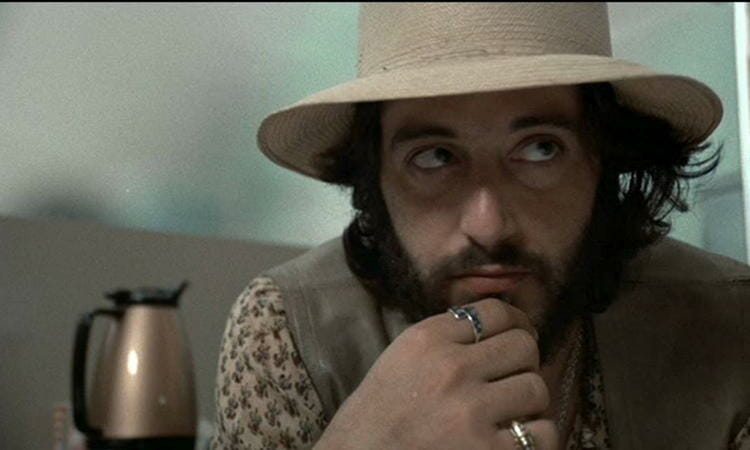

Al Pacino is one of the all time greats in acting. It’s as simple as that. On stage and on screen his ability to convince an audience of his emotions (often in the many unbelievable monologues he’s performed), and to become an entirely new person is astonishing and electrifying. Believe me, that makes this task of picking the Top 10 Pacino movies very, very hard. Save for a few recent hiccups, he’s one of the only actors to rarely have taken a wrong step. Even when he has, we can forgive him in recognition to all those times he’s got it so right.
If there’s anything on this list you haven’t seen, then get on it.
A few noteworthy films not on the list: The Panic In Needle Park, Insomnia, You Don’t Know Jack, The Godfather III, Cruising.

10. Carlito’s Way (1993)
I can’t tell if this is one of those ‘so bad, it’s good’ films or if it’s actually just great. Either way, De Palma’s Puerto Rican gangster flick is a must watch, and yet another Pacino film that has influenced Rockstar’s Grand Theft Auto and many other video games.
Pacino plays Carlito, an ex-convict cleared of drug charges after years of jail time. Carlito aspires to get away from his old life and out of the city, but his lawyer Kleinfeld (Sean Penn) has other plans for him. Whenever Carlito feels he’s a step closer to becoming a legitimate businessman, the actions of his piece’a’shit lawyer pull him right back into the thick of it.
It’s a typical De Palma film, with an iconic performances from Pacino and Penn and an extremely entertaining Screenplay from David Koepp (see the pool trick shot scene). Watch it. You can’t go wrong with a cult classic.

9. Heat (1995)
I like to forget Righteous Kill (2008) ever happened and stick to the fantasy that Michael Mann’s Heat contains the only on screen dialogue between two of the best actors to have ever done it: Al Pacino and Robert De Niro.
If it weren’t for Point Break, I would say that this film is to the Heist movie what Serpico is to the Cop flick. Of course, I can still say it’s extremely influential in that genre. All you’ve gotta do is play any one of the Grand Theft Auto games, and you’re instantly reminded of Heat.
Set in Los Angeles, Mann’s Heat puts us in a world where the ‘Cops and Robbers’ have a mutual respect reminiscent of that between Ancient Gods. That classic scene between Lt. Vincent Hanna (Pacino) and bank robber Neil McCauley (De Niro) feels like a conversation between God and the Devil. However, the mutual respect between both parties does not extend into their business. When a job needs to be done, those that get in the way will feel the wrath of the gods, no matter who they are.
As always with a star cast, the acting is straight out the top drawer, with Pacino, De Niro, Val Kilmer, Jon Voight and many more getting down to business as usual. Michael Mann’s screenplay shows us why. Fast paced when it needs to be, with unbelievable dialogue, this is one of a few scripts that I revisit constantly as a writer.

8. Donnie Brasco (1997)
Based on the true story of how Agent Pistone used the alias of Donnie Brasco, or Don the jeweler, to infiltrate the Mafia in 1970s New York City, director Mike Newell’s gangster flick remains one of my all time favorites.
Agent Pistone (Johnny Depp) befriends one of the Mafia’s hitmen, Lefty, played brilliantly by Al Pacino. Lefty takes Pistone in and teaches him the ways of a ‘wise guy’. But just when it seems that all is going according to plan for the FBI, Pistone becomes a little too comfortable in his role as Donnie Brasco, developing real feelings for Lefty and diving deeper into the Mafia underworld.
Donnie Brasco really is essential viewing for those obsessed with Al Pacino and the Gangster genre in general. Normally, we expect to see Al in the position of top dog, but his role as Lefty sees him take on an unusual position as foot soldier. Despite this fact, Pacino’s performance as a heartfelt, witty but dangerous man struggling to stay afloat is wonderful.
Paul Attanasio’s script is brilliant, with endless quotes and many a classic scene to thoroughly enjoy, whether watched on screen or read on paper. It’s no wonder it earned Attanasio an Academy Award nomination for his Adapted Screenplay.

7. Glengarry Glen Ross (1992)
Now this is my type of film. It’s simplistic but runs with quick witted fluidity thanks to James Foley’s directing and, of course, David Mamet’s superb screenplay, adapted from his own play of the same name. It’s like the simple Margin Call type version of The Wolf Of Wall Street, but for the property business, and without the ‘epicness’.
Set in a real estate office in New York City, Glengarry Glen Ross shows us the lives of the office salesmen as they fight to close their deals in order to keep their jobs after a visit from Blake (Alec Baldwin), one of the top dogs in the firm. Blake brings in the solid Glengarry leads, but says that only closers get to have them. Of course, this pisses off those who are not closers.
Pacino plays Ricky Roma, top salesman in the office and the only one allowed to access the Glengarry leads. Like all films on this list, Pacino’s performance is genius. Loud, cocky, hilarious, Ricky Roma is a real character played to perfection by Pacino. In fact, the same can be said for all the roles played in this gem of a film, from Lemmon to Spacey and Arkin to Harris. Even Baldwin kills his role with a brilliantly executed speech.
What allows these actors to enjoy a field day is Mamet’s script. Whether you read the play or the screenplay, the dialogue and direction is like poetry.

6. Scarface (1983)
Greed, excess, blood and cocaine. Lots and lots of cocaine. It’s hard to believe this cult classic was received with such negative reviews following it’s initial release. Well, actually, it’s not hard to believe, but let the haters hate.
Brian De Palma’s epic gangster flick sees Tony Montana, a Cuban immigrant in the US played to perfection by Al Pacino, climb out from the Cuban camps in Miami to build a huge cocaine empire. He’s evil, he’s dangerous, he kills anyone standing in his way, but overall, he is human. A power hungry human who forgets that despite his ability to seemingly get what he wants, nobody is immortal and there is always someone or something more powerful than you are.
Scarface has everything you could ever want from a Gangster film, and best of all it refuses to take itself too seriously. Tacky suits, a distinctively 80s soundtrack, Michelle Pfeiffer with bangs, and like all the best Pacino films, endless quotes. Props to the screenwriter, Oliver Stone. It’s an extremely entertaining read, and an even better viewing experience.
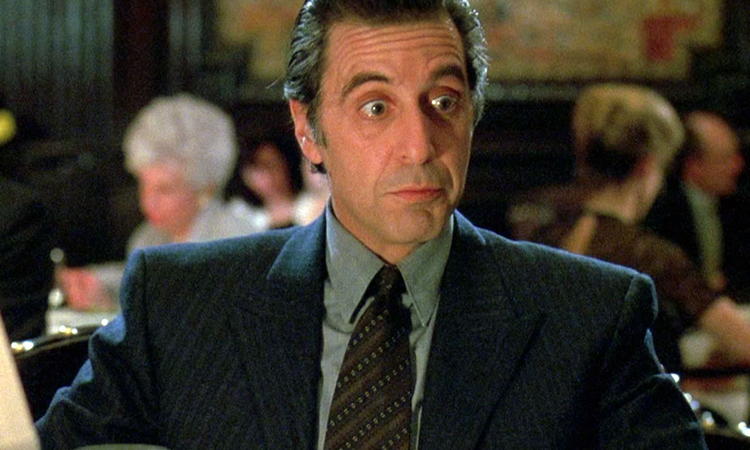
5. Scent Of A Woman (1992)
The film that earned Pacino his first and only Academy Award to date sees him take on the role of Lieutenant Colonel Frank Slade, a mean old veteran who lost his sight in the war and is scorned on by the majority of his own family.
Another adaptation of a book, Martin Brest’s film tells the story of Charlie Simms (Chris O’Donnell), a working class prep school kid on a scholarship who takes on the job of looking after Lieutenant Colonel Slade while his sister and her family go away for Thanksgiving. What he thought would be an easy job, turns into an expensive trip to New York City, where the relationship between the two blossoms from initial strain to true camaraderie.
Pacino’s performance as the blind man Frank Slade, struggling with depression and the memories of his past, is a real master class. Many who have watched Scent Of A Woman would agree with that. But credit to the screenwriter, Bo Goldman (One Flew Over The Cuckoo’s Nest), for creating such unforgettable scenes that have had me, and I’m sure many others, quoting and re-enacting for years. (Pacino’s speech at the end is particularly epic.)
Great story, brilliant performances, beautiful film. Hooah!
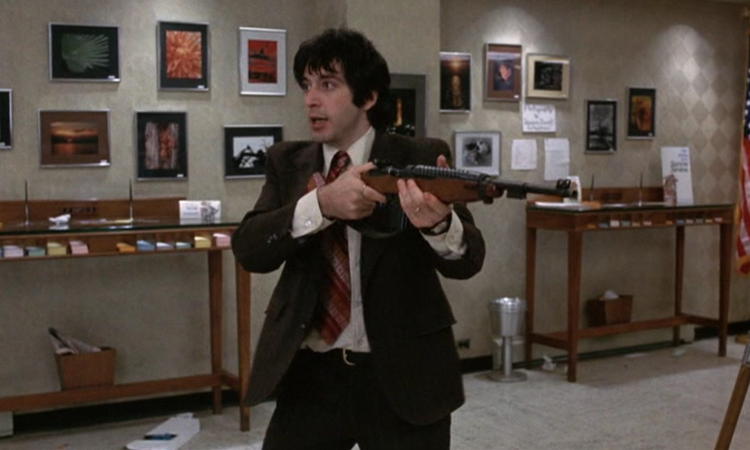
4. Dog Day Afternoon (1975)
It was all supposed to be so easy. Sonny (Al Pacino) and his accomplice Sal (Joe Cazale) go into a Brooklyn bank in an attempt to rob it. Sonny looks all set to get away with the money for a sex change operation for his lover, Leon (Chris Sarandon), but the cops show up out of nowhere. From then on it’s a chaotic parade as the police fight to get the hostages out and news cameras catching all the action.
Beautiful stuff once again from another Sidney Lumet and Al Pacino collaboration. It’s tense, it’s simple, and as always with Pacino, it’s beautifully acted. But once again, it’s one of those films that goes under the radar today.
Frank Pierson’s screenplay is phenomenal also. It’s a perfect blend of suspense, realism and some brilliant black humor at all the right times. Together with Sidney Lumet as director, they really capture the 1970s New York City vibe, much the same way that Lumet managed to do with Serpico. It’s no wonder this take on the true story of a Brooklyn bank robbery earned Pierson the Academy Award for best Original Screenplay.
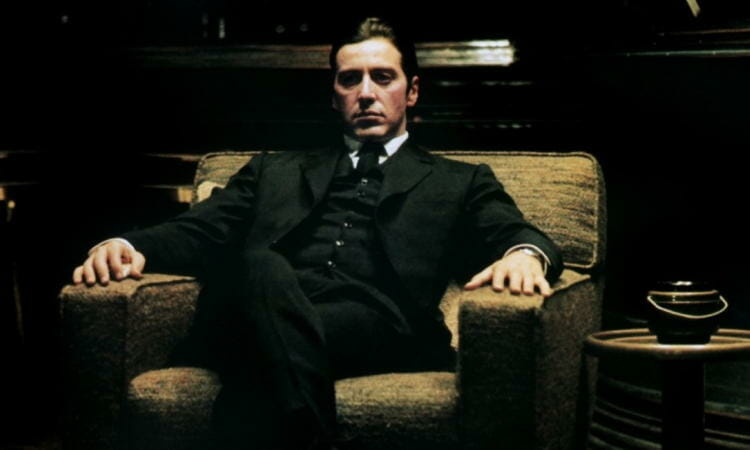
3. The Godfather: Part II (1974)
The second of Francis Ford Coppola’s masterpiece is split into two stories, one of which follows Robert De Niro as Don Corleone as he rises from poor Italian Immigrant in 1920s New York, to an extremely feared and respected mobster. At the same time, we return to Michael Corleone (Al Pacino) in the 1950s, whose power as the family’s Don has increased. Like his father, Michael has acquired many political contacts, allowing his operation to spread throughout the country, from the casino business in Las Vegas and even to Cuba. Michael wants to legitimize the family business, but with great power comes a great number of enemies.
Dark, sinister, but beautiful, Part II has a slight change in tone from the first installment. De Niro is also a delight to watch as a charming and mysterious young Don Corleone. Of course, Duvall, Keaton and Cazale continue to shine on from their performances in the first, further proving the claim that Coppola’s first two in the trilogy have the best acting ensemble of all time. Pacino is excellent in his struggle to transform the Corleone syndicate. When once they were one in the same, now he wants to keep his business and his family as far apart as possible. The anger and emotional turmoil he goes through comes through stunningly. Superb acting. The relationships will shock you and move you.
Again, Puzo and Coppola collaborate on the Academy Award winning screenplay. As you can imagine, it’s a wonderful read with classic scenes and quotes to be remembered for generations. From the screenplay to the actors’ performances and the finished product itself, The Godfather trilogy is truly inspirational for any aspiring writer and filmmakers.
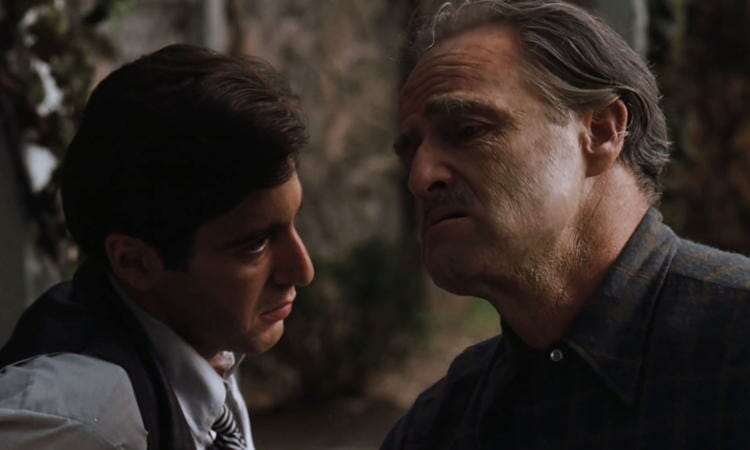
2. The Godfather (1972)
Arguably the best films in cinematic history let alone the best adaptation, the first film in Francis Ford Coppola’s The Godfather trilogy cannot and will not be separated.
The first of this spectacular trilogy starts in 1940s New York. We follow the lives of the Corleone family, a rich and powerful Mafia family, and also a large importer of Olive Oil, run by Don Corleone (Marlon Brando) and later by Michael Corleone (Al Pacino). Believe me, that’s no spoiler. You could know the entire outcome of these films and still be in awe. Michael Corleone starts off as something of an outcast, going against his father’s wishes in dropping out of college to join the army. The family business is the last thing on Michael’s mind. Till one day, a rival family attempt to assassinate Don Corleone due to his refusal to invest in the growing narcotics business, causing Michael to have a change of heart.
I’m certain The Godfather still holds the title for the greatest acting ensemble of all time. From Brando to James Caan; Robert Duvall to Al Pacino; Diane Keaton to John Cazale; the actors’ performances are absolutely breathtaking. No wonder it earned itself so many acting nominations at the Academy Awards.
Those who’ve read Mario Puzo’s novel of the same name will agree that one could easily have put it into that category of ‘impossible to adapt’. Of course, it helps that Puzo himself collaborated with Coppola for the incredible Academy Award winning screenplay for both films, but even so, it just goes to show that anything is possible.

1. Serpico (1973)
The cop flick to end all cop flicks, Sidney Lumet’s Serpico marks the first of his two collaborations with Pacino. Most will frown upon my decision to put this masterpiece ahead of Francis Ford Coppola’s The Godfather I &II, but just to clarify I’d put them all joint first if I could. I chose Serpico simply because, of the three, it is often overlooked.
Waldo Salt and Norman Wexler’s excellent adapted screenplay really is a benchmark for all films of this genre. It tells the true story of Frank Serpico, an eccentric New York cop determined to tackle police corruption in his department. As he is transferred to various different departments following his complaints, he starts to realize the corruption runs deeper than just his previous department and the police force itself. As more and more of his fellow officers discover his honest nature, Serpico finds it harder and harder to find people to trust.
Fantastic performances all around, with special props for whoever was in charge of Pacino’s hair and wardrobe.